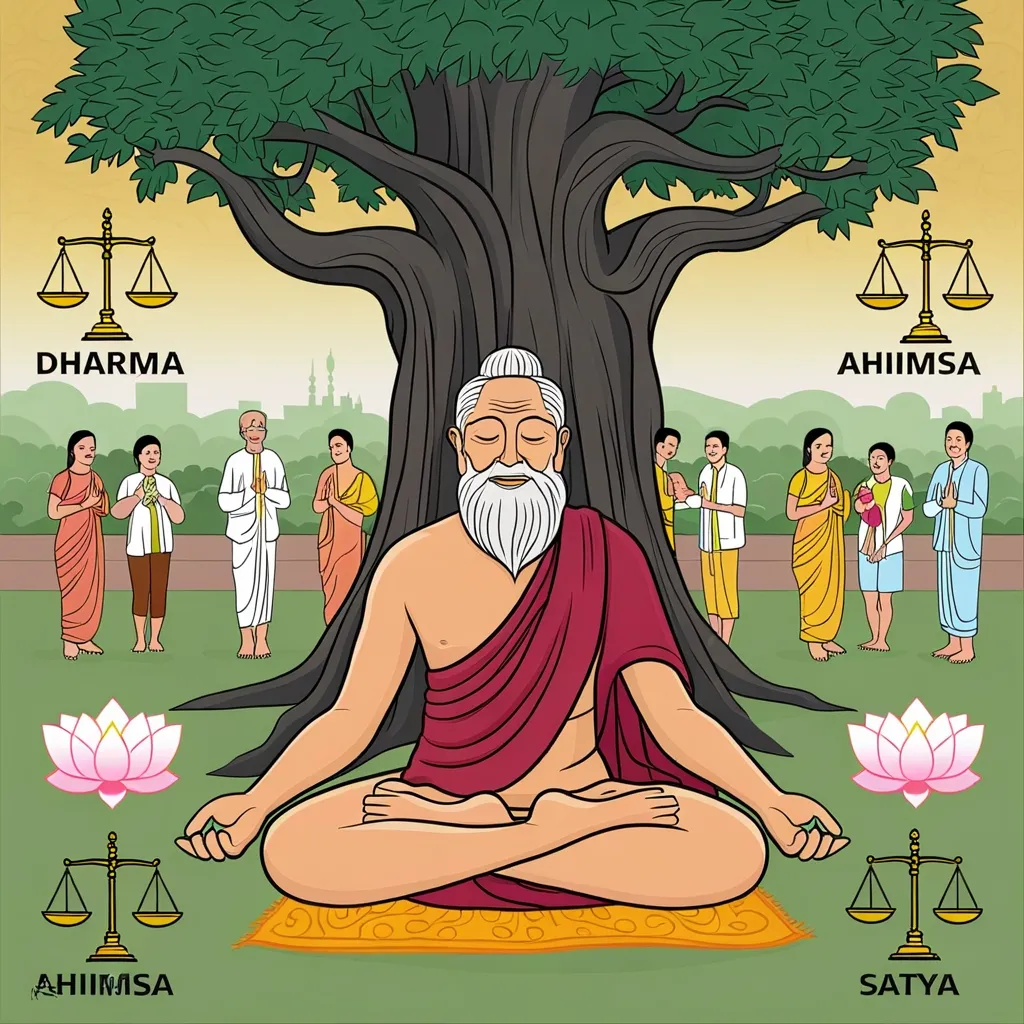The Yajur Veda stands proudly as one of the four sacred texts of Hinduism, brimming with spiritual, philosophical, and ethical teachings. This ancient collection of prayers, rituals, and mantras has provided guidance on righteous living for thousands of years, and it still resonates deeply today. Its core emphasis on moral duty and ethical behavior makes it an enduring source of inspiration for anyone seeking a virtuous and meaningful life.
One of the foundational ideas in the Yajur Veda is the concept of Dharma. This isn’t just any old ethical guideline—it’s a compass for moral, social, and religious duties. Dharma urges us to act with integrity and kindness in our dealings with everyone, whether family, friends, or strangers. It’s a call to be truthful, trustworthy, and to fulfill our obligations to the best of our abilities. This principle isn’t solely about personal behavior; it’s about contributing to the well-being of society as a whole.
Another game-changing principle from the Yajur Veda is Ahimsa, or non-violence. Now, Ahimsa isn’t just about avoiding physical harm. It extends to not injuring others verbally or emotionally. It’s about fostering compassion and respect for all living beings. Ahimsa encourages us to choose kindness over cruelty in every action we take, promoting peaceful coexistence and harmony within our communities.
Satya, or truthfulness, is another cornerstone of the Yajur Veda. This principle emphasizes the importance of honesty and transparency in all our interactions. When we are truthful, we build strong, reliable relationships and foster a sense of community. Satya isn’t just about speaking the truth but living a life aligned with honesty and authenticity in every way.
The Yajur Veda also teaches the importance of balancing renunciation with enjoyment. It advises us to enjoy what the world offers, but with a spirit of renunciation, avoiding greed. This balance is neatly summed up in the mantra “Tena tyaktena bhunjitha, ma grdhah kasya svid dhanam,” which translates to, “That renounced, thou shouldst enjoy; covet not anybody’s wealth.” It’s a gentle reminder to appreciate what we have without becoming overly attached to material possessions.
Another brilliant insight from the Yajur Veda is the reconciliation of individualism and collectivism. This idea highlights the importance of both personal progress and collective welfare. It stresses that our growth should be aligned with the well-being of our communities, fostering a harmonious and equitable society.
The Yajur Veda also talks about creating a harmony between faith and reason. It encourages us to cultivate both these faculties, blending them in such a way that they complement each other. This integration helps us make informed and wise decisions, where faith and reason work hand in hand.
While the Yajur Veda is well-known for its ritualistic aspects, emphasizing detailed instructions on sacrificial rituals, it acknowledges that these rituals alone aren’t enough. True spiritual progress requires living a virtuous and ethical life. The rituals call upon divine forces to ensure cosmic order and seek blessings for prosperity, health, and spiritual enlightenment.
Beyond rituals, the Yajur Veda offers profound philosophical insights. It houses important Upanishadic texts like the Isha Upanishad, delving into themes of spiritual knowledge, the nature of the self, and the ultimate reality, or Brahman. These philosophical nuggets have significantly influenced Hindu thought and practice, enriching various schools of Indian philosophy.
The impact of the Yajur Veda extends far beyond its pages. It has shaped Indian culture and society profoundly, influencing cultural practices, arts, and literature. The intricate rituals described in the Yajur Veda have been preserved and adapted over millennia, maintaining their relevance in contemporary Hindu worship and cultural celebrations.
In today’s world, the Yajur Veda continues to inspire those interested in Vedic traditions and spirituality. Its teachings on ritual, ethics, and spirituality resonate deeply with individuals seeking spiritual growth and insight into the nature of existence. The Yajur Veda stands as a testament to the rich spiritual and intellectual heritage of ancient India, offering timeless wisdom that continues to guide spiritual seekers globally.
So, how can we apply these Yajurvedic principles in our daily lives? Let’s break it down with some practical examples:
Practicing Dharma is like starting your day with kindness and respect towards everyone you meet. Fulfill your duties and obligations with integrity, be it at work, home, or within your community. Embracing Ahimsa means choosing kindness over cruelty in all your interactions. Show compassion towards all living beings and avoid causing harm in any way. Being truthful involves being honest and transparent in all your dealings. Build strong relationships by being reliable and trustworthy.
Finding balance, as suggested by the Yajur Veda, means enjoying life’s pleasures without becoming overly attached. Practice renunciation and appreciate what you have without constantly craving for more. Contributing to society means aligning your personal growth with the well-being of your community. Participate in collective welfare and help promote a harmonious society.
By incorporating these principles into our daily lives, we can live more ethically, harmoniously, and meaningfully. The Yajur Veda’s teachings aren’t just ancient wisdom but timeless guidance that helps us navigate the complexities of modern life with integrity and purpose.
The Yajur Veda is a rich and complex text offering valuable insights into the spiritual, philosophical, and cultural life of ancient India. Its ethical principles, such as Dharma, Ahimsa, and Satya, provide a comprehensive framework for righteous living. By embracing these principles, we can lead lives that are not only virtuous but also fulfilling and meaningful. The Yajur Veda’s influence extends beyond its ancient roots, offering wisdom as relevant today as it was thousands of years ago.






